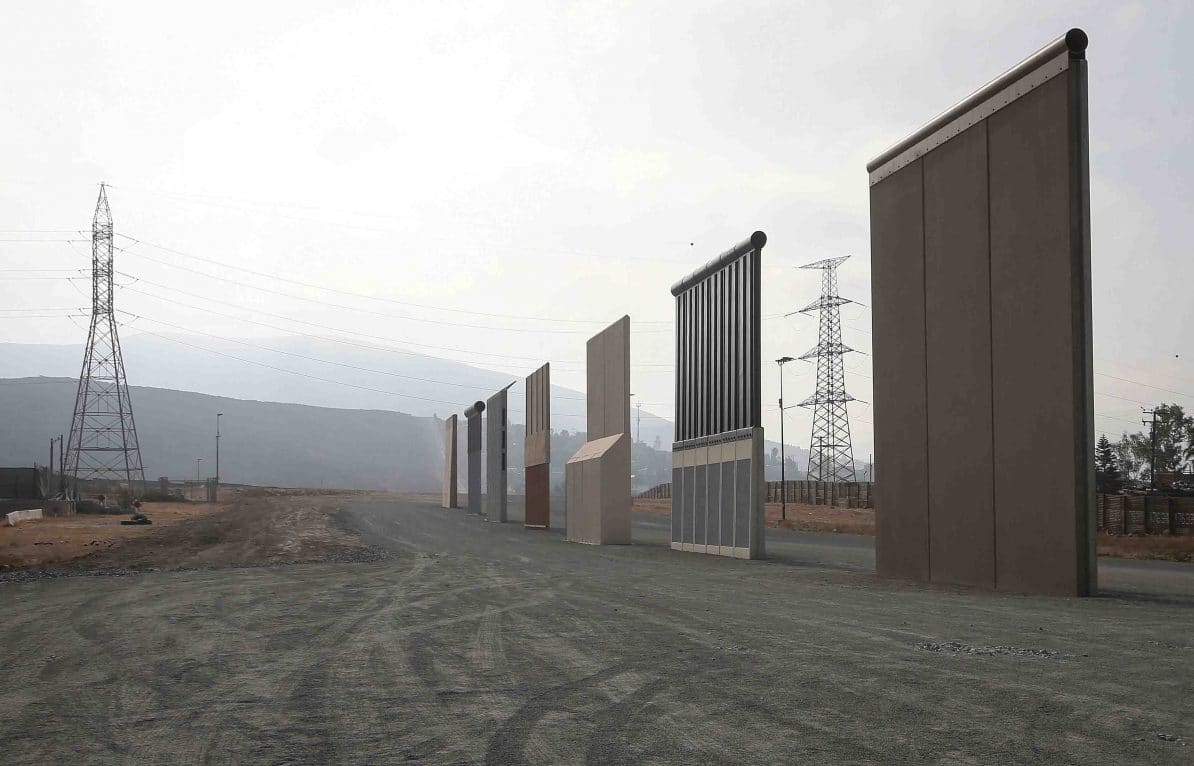Trump vs immigration: Jean Guerrero
The US election of 3rd November ended in victory for Democratic candidate Joe Biden, but his opponent was not prepared to give up without a fight. Donald Trump’s attempt to overturn the vote may have been alarming, but wasn’t unforeseen after a pugnacious single term characterised by distrust and hostility. In issue 41 of Delayed Gratification we spoke to experts and insiders to get their views on the numerous conflicts fought by the 45th president.

Prototypes for the proposed US-Mexico border wall are exhibited in San Diego, California, 16th June 2018
3rd Nov 2020 (Taken from: #41)
This is the sixth interview in an eight-part series.
Jean Guerrero
Author and journalist

Jean Guerrero was working as a border reporter in San Diego, California, when Donald Trump descended a golden escalator in Trump Tower to the sound of Neil Young’s ‘Rockin’ in the Free World’, announced his candidacy and made a statement that set the tone for the campaign: “When Mexico sends its people, they’re not sending their best… They’re bringing drugs, they’re bringing crime, they’re rapists. And some, I assume, are good people.”
“At the time I was spending my days talking to asylum seekers at the border who’d come here fleeing violence,” says the San Diego native. “I remember hearing Trump call Mexicans rapists and thought, ‘Things are so awful for immigrants at the border I can’t imagine someone proposing to make their lives even worse coming to power.’ Obviously that was naive of me.”
Immigrant rights activists used to call Barack Obama the ‘deporter-in-chief’, and Guerrero says that by ordering mass deportations on an unprecedented scale he laid the groundwork for his successor. “But what Trump did was far worse. It was about deliberately trying to traumatise these families, to use separation as a deterrence strategy,” she says.
Few, if any, Trump policies caused as much outrage as the April 2018 ‘zero-tolerance’ immigration ruling, which resulted in nearly 3,000 children being separated from their parents in just six weeks. The policy called for the prosecution of all people illegally entering the country, and resulted in family separations when the parents were referred for prosecution and their children were put into custody; although the law wasn’t new, previous administrations hadn’t fully enforced it. After the publication of images showing appalling conditions at some of the child migrant detention facilities, the president, sensing growing public anger, ended the policy with an executive order. The administration denied its goal was the separation of families and said it was simply enforcing the law.
He was deliberately traumatising families”
There is evidence that families were being separated before ‘zero-tolerance’, however. In December 2017, Guerrero interviewed Jose Demar Fuentes, a Salvadorian migrant fleeing gang violence whose one-year-old boy Mateo was taken from him by immigration officials at the US border; they claimed he didn’t have documentation proving he was the father and that separation was in the boy’s best interest. “He had no idea where his toddler was and he was
just bawling during the interview,” Guerrero recalls. She returned to report on the family when they were reunited eight months later. “The trauma of separation was so evident,” she says. “Mateo was covered in lice and his mum had to wash him six or seven times just to get the dirt off him. He was crying all the time.”
To better understand the origins of the administration’s ‘zero-tolerance’ policy, Guerrero wrote a biography of Stephen Miller, the Trump advisor credited with crafting it. Guerrero says that Miller was put in charge of the immigration issue by Trump and was, according to many people she interviewed, seemingly unmoved by the suffering of others. “For Miller it’s not about cartels or criminals coming into the US, it’s about families and demographics and his fear that America is becoming too brown.” Researching Miller’s history and alleged white nationalist ideology took its toll on the writer, a child of Mexican and Puerto Rican parents. “As someone who fits the profile of somebody Miller would not want in this country it was incredibly disturbing,” she says, adding that she was “very sick” after finishing Hatemonger, and thinks that “inhabiting a dark world” of white supremacy contributed to her illness.
It may not be too hard for Joe Biden – who has apologised for his role in the Obama administration’s mass deportations – to undo much of Trump’s immigration legacy. There is no new “big beautiful wall” to demolish – the Trump administration only managed to build 47 miles of new structures (where none existed before) along the border, and Mexico certainly didn’t pay for them. But Guerrero fears that Trump “destroyed the reputation of the US globally as a beacon of hope and refuge for people fleeing persecution”.
“I think that’s going to outlast the Trump administration,” she says. “And it will possibly outlast the Biden one too.”
Slow Journalism in your inbox, plus infographics, offers and more: sign up for the free DG newsletter. Sign me up
Thanks for signing up.








